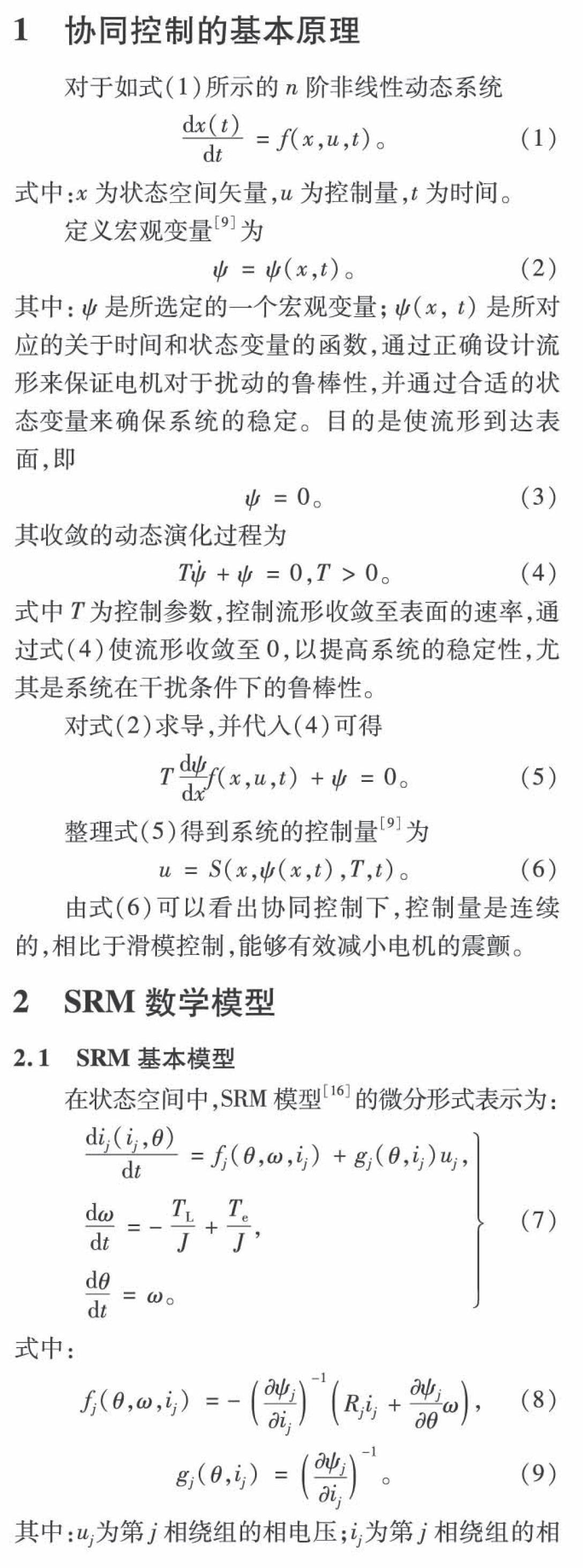开关磁阻系统鲁棒性控制方法研究
2020-04-22刘勇智李杰戴聪周政
刘勇智 李杰 戴聪 周政



摘 要:在航空起动/发电系统中,开关磁阻电机(switched reluctance motor ,SRM)的双凸极结构和高转矩脉动使航空起动/发电系统模型表现出高度的非线性和不确定性。为了解决SRM的非线性问题,提高系统的响应速度,降低转矩转速脉动,同时提高系统的抗干扰能力,本文基于协同控制和自适应模糊逻辑的基本原理,提出了一种自适应模糊终端协同控制方法(adaptive fuzzy terminal synergetic control, AFTSC)。针对开关磁阻系统模型的高度非线性和不确定性,协同控制确保了系统的鲁棒性,模糊逻辑估计了控制律的非线性方程,提高了控制器的有效性,同时降低了系统的计算体量。仿真和实验结果表明,在自适应模糊终端协同控制方法下,开关磁阻电机系统表现出更好的响应特性,该控制器对于开关磁阻电机转速和转矩的变化表现出更强的鲁棒性,相比于常规基于遗传算法的PID控制器具有更好的性能。
关键词:开关磁阻电机;协同控制;自适应模糊逻辑;鲁棒性;PID控制
DOI:10.15938/j.emc.2020.03.011
中图分类号:TM 352文献标志码:A文章编号:1007-449X(2020)03-0088-09
Abstract:In the air start / power generation system,the doubly salient structure and high torque ripple of switched reluctance motor (SRM) make the air start / power generation system model highly nonlinear and uncertain. In order to solve the nonlinear problem of SRM, improve the response speed of the system, reduce the torque and speed ripple, and improve the antiinterference ability of the system at the same time, based on the basic principles of cooperative control and adaptive fuzzy logic, an adaptive fuzzy terminal cooperative control method is proposed in this paper. Considering the high uncertainty and nonlinearity of the SRM model, robustness was verified by synergetic controller; the nonlinear function of the control law was estimated and the calculation was simplified by adaptive fuzzy logic and therefore the effectiveness was improved. Simulation and experimental results show that the controller has good response performance and robustness to speed and load changes. Compared with GAPID, the proposed method has better performance.
Keywords:switched reluctance motor; synergetic control; adaptive fuzzy logic; robustness; PID control
0 引 言
開关磁阻电机近年来由于其简单的结构、高度的容错能力、较低的损耗,受到越来越多的关注,尤其是在F-35战斗机上的应用,使它的使用价值得到进一步拓宽,开关磁阻起动/发电系统逐渐成为航空市场的主流。然而,其特殊的双凸极结构和高转矩脉动所带来的模型的高度非线性和不确定性,对电机的实际控制提出了很高的要求。如何对电机实行有效的控制,以降低转矩脉动,提高电机的快速响应和抗干扰能力成为当下研究的热点。
为了提高转速性能,降低转矩脉动,提高系统鲁棒性,多种方法被应用于SRM,如神经网络[1-2],模糊逻辑控制[3-4],但是这些控制方式计算体量大,对控制器要求较高,工业上不易推广。新型控制方式,如预测控制[5-6],滑模控制[7-8]在SRM上也有所延伸。文献[5]将预测控制应用于SRM的转矩控制,将电感表面学习机制应用于电流预测,提高了电机的控制精度;文献[6]将无约束模型预测控制器应用于电机的电流控制,有效降低了电机的电流和转矩脉动,但是预测控制对于计算速度要求较高;文献[7]设计了转矩观测器获取实际转矩,设计滑模控制器调节转矩误差,有效抑制了转矩脉动;文献[8]将滑模应用于汽车充电电抗器中SRM控制,有效提高了电能质量,但是变结构滑膜控制器需要高带宽,同时易引入噪声。
协同控制理论(SCT)是由俄罗斯研究员科列斯尼科夫提出的一种新型控制方法[9],其优势在于便于数字化实现,同时可以工作于连续恒定的开关频率,降低电机震颤,目前在电力系统[10],DCDC升压转换器[11]等方面有着广泛的应用。在电机控制方面,文献[12]将协同控制运用于永磁同步电机,实现了在不变流形上对二阶系统的自然线性化和降阶;文献[13-14]将协同控制引入感应电机的转速控制,提高了电机在外部干扰下,转速的稳定性;Louri等人将协同控制和滑模控制在非线性系统中的抗干扰能力进行比较,发现协同控制具有更强的鲁棒性和响应速度[15],这也进一步验证了协同控制在SRM这种高度非线性系统中有很广阔的应用前景。为了解决SRM的非线性问题,提高系统的响应速度,降低转矩转速脉动,同时提高抗干扰能力,本文将协同控制引入SRM,将输入电压u作为控制量,实现对SRM的控制。然而,就像其他基于模型的控制技术,协同控制技术也高度依赖于模型的精确性,针对此问题,本文引入终端自适应模糊逻辑对非线性模型进行估计,设计了自适应模糊终端协同控制器实现了对SRM的精确控制。
7 結 论
本文基于协同控制和模糊逻辑的基本原理,针对开关磁阻起动系统这一控制对象,设计了自适应模糊终端协同控制器。首先提出了一般协同控制方法,并给出了协同控制器的一般方程。这一控制器控制律连续,能够较小系统的震颤,同时确保了系统的鲁棒性。其次设计了终端协同控制器确保了系统误差能够在有限时间内收敛,确保了控制器的有效性。再将自适应模糊逻辑应用于所设计的控制器,实现了对控制律中的所出现的非线性函数H(x)和G(x)的有效估计,在提高控制器准确性的同时,也减小了系统控制律的计算体量。最后设计相应的李雅普诺夫函数,证明了所提出的控制器的稳定性。仿真和实验结果证明了,在该控制方法下,系统具有优良的动静态性能和较好的鲁棒性,相比于遗传PID方法,其控制效果更加优越,在实际应用中具有广泛的前景。
参 考 文 献:
[1] 高宇,戴跃洪,宋林.基于BP神经网络的开关磁阻电机建模[J].电力电子技术,2017,51(2):72.
GAO Yu, DAI Yuehong, SONG Lin.Modeling of switched motor based on BP neural network[J]. Power Electronics, 2017,51(2):72.
[2] 夏长亮,陈自然,李斌.基于RBF神经网络的开关磁阻电机瞬时转矩控制[J].中国电机工程学报,2006,26(19):127.
XIA Changliang, CHEN Ziran, LI Bin. Instantaneous torque control of switched reluctance motors based on RBF neural network[J].Proceedings of the CSEE: 2006,26(19):127.
[3] 修杰,夏长亮.基于遗传算法的开关磁阻电机自适应模糊控制[J].电工技术学报,2007,22(11):69.
XIU Jie,XIA Changliang. GAbased adaptive fuzzy logic controller for switched reluctance motor[J]. Transactions of China Electrotechnical Society, 2007,22(11):69.
[4] 郑国,郑万新.基于开关磁阻电机光伏水泵系统模糊控制研究[J].中国电力,2017,50(1):146.
ZHENG Guo, ZHENG Wanxin. Research on fuzzy control of PV pumping system based on switched reluctance motor[J]. Electric Power,2017,50(1):146.
[5] XIN Li, POURYA SHAMSI. Inductance surface learning for model predictive current control of switched reluctance motors[J].IEEE Transactions On Transportation Electrification,2015,1(3):287.
[6] XIN Li, POURYA SHAMSI.Model predictive current control of switched reluctance motors with inductance autocalibration[J]. IEEE Transactions On Industrial Electronics, 2016,63(6):3934.
[7] ZAN Xiaoshu. Switched reluctance motor speed performance simulation study based on torque ripple suppresslon[C] // Luoyang: International Conference on Advanced Mechatronic Systems, 2013: 253-257.
[8] RASHIDI A,NAMAZI M M.Zero torque control of switched reluctance motors for charging reactor of electric vehicles[C]//Busan: IEEE International Conference on Advanced Intelligent Mechatronics (AIM), 2015: 990-995.
[9] KOLESNKOV A,VESELOV G,KOLESNIKOV A, et al.Synergetic synthesis of DCDC boost converter controllers: theory and experimental analysis[C] // Dallas: 7th Annual IEEE Applied Power Electronics Conference and Exposition, 2002: 409-415.
[10] BOUCHAMA Z,HARMAS M.Optimal robust adaptive fuzzy synergetic power system stabilizer design[J]. Electr. Power Syst. Res, 2012, 83(1):170.
[11] HARMAS M,HAMZAOUI A,HARMAS K.Adaptive fuzzy synergetic converter control[C]//Taibah: International Conference on Computing and Information Technology(ICCIT)2012:734-738.
[12] BASTOS J,MONTI A,SANTI E. Design and implementation of a nonlinear speed control for a PM synchronous motor using the synergetic approach to control theory[C]//Aachen: 35th Annual IEEE Power Electronics Specialists Conference, 2004:3397-3402.
[13] YOUNG DAE SON,TAE WONHEO,ENRICO SANTI.Synergetic control approach for induction motor speed control[C]//Busan:The 30th Annual Conference of theIEEE Industrial Electronics Society, 2004: 883-887.
[14] ABOLFAZL RANJBAR NOEI,HEDYEH AGHEH KHOLERDI.Robust speed control of induction machine using synergetic controller[C]//Tehran: 2nd International Conference on KnowledgeBased Engineering and Innovation (KBEI),2015: 880-885.
[15] LOURI M,AMRANE A,BARAZANE L.Comparison between theperformances of variables structures control and the theory of synergetic on applied to the squirrel motor drives[C]//Algiers: 3rd International Conference on Systems and Control(ICSC), 2013: 293-298.
[16] 霍麗华,杨建忠.基于目标状态方程的SRM非线性预测控制[J].中国民航大学学报,2009,27(02):31.
HUO Lihua, YANG Jianzhong. Nonlinear predictive control for SRM based on TSEs[J].Journal of Civil Aviation University of China, 2009,27(02):31.
[17] SUGENO M,KANG G T.Structure identification of fuzzy model[J].Fuzzy Sets and Systems, 1988,28(2):15.
(编辑:贾志超)
